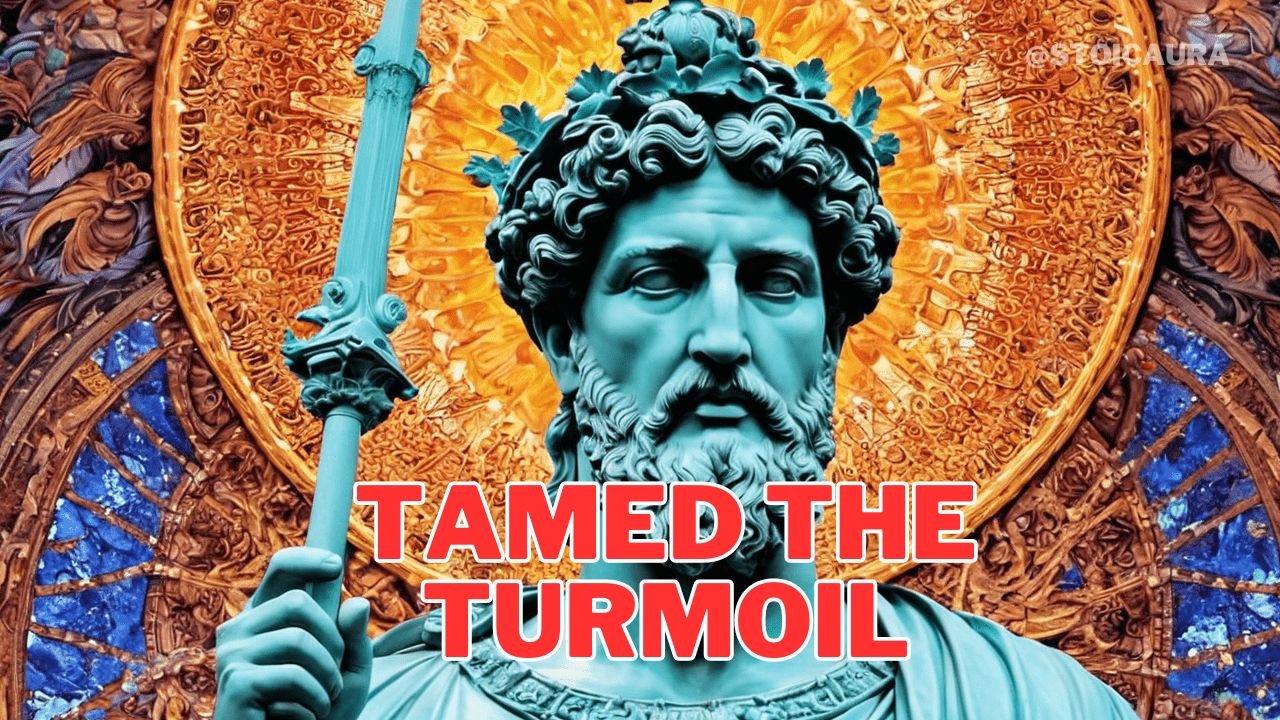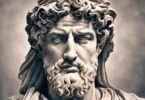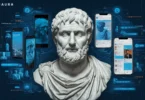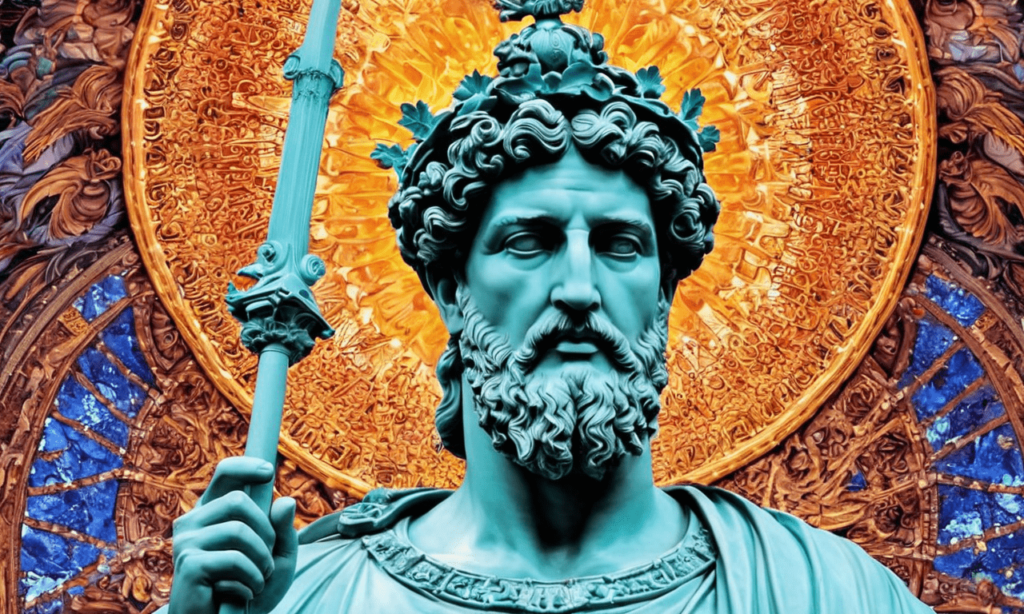
Introduction
Welcome, fellow seekers of wisdom, to a journey through the life and teachings of one of history’s greatest Stoic philosophers and emperors, Marcus Aurelius. In the annals of history, Marcus Aurelius stands as a beacon of tranquility amidst the storms of power, politics, and personal struggles. As the ruler of the Roman Empire, he faced the daunting task of governing an empire while grappling with his own inner battles.
From his early days as a student of Stoic philosophy to his reign as emperor, Marcus Aurelius exemplified the principles of Stoicism in his daily life, earning him admiration as the philosopher king. But what were the tools and techniques that Marcus Aurelius employed to tame the turmoil within? Join us as we delve into the depths of Marcus Aurelius’ stoicism, exploring how his teachings can guide us towards greater serenity and self-mastery in our own lives.
A. Setting the Stage: Exploring the Life of Marcus Aurelius
- Introduction to Marcus Aurelius and his significance in Stoicism
Marcus Aurelius, often hailed as one of the most renowned Stoic philosophers, holds a significant place in the annals of history for his profound contributions to Stoicism. As a philosopher-king of ancient Rome, Marcus Aurelius embodied the principles of Stoicism in both his governance and personal life. His magnum opus, “Meditations,” serves as a timeless guide to navigating the complexities of existence with wisdom and resilience. Beyond his philosophical endeavors, Marcus Aurelius’ tenure as a gladiator further exemplifies his commitment to Stoic principles, facing life’s adversities with steadfast composure.
Through his writings and actions, Marcus Aurelius continues to inspire countless individuals seeking inner peace and moral clarity amidst the tumult of existence. His legacy as a philosopher, ruler, and exemplar of Stoic virtues resonates across centuries, offering invaluable insights into the human condition and the pursuit of Stoic tranquility.
- Brief overview of Marcus Aurelius’ life, including his role as a Stoic emperor and his experiences as a gladiator
Marcus Aurelius, the esteemed Roman Emperor from 161 to 180 AD, left an indelible mark not only as a ruler but also as a philosopher deeply rooted in Stoicism. Born into a prominent family, Marcus Aurelius ascended to the throne at a time of significant challenges for the Roman Empire. Despite the weight of his duties, he remained committed to the tenets of Stoic philosophy, seeking tranquility and virtue amidst the chaos of governance. One of the lesser-known aspects of his life was his brief stint as a gladiator, a decision made out of a desire to experience the life of an ordinary citizen and to test his Stoic resilience in the face of adversity.
Throughout his life, Marcus Aurelius exemplified the ideals of Stoicism, leaving behind a legacy of wisdom and fortitude that continues to inspire generations.
B. The Power of Stoicism in Cultivating Inner Peace
- Explanation of Stoicism as a philosophy of resilience and tranquility
Stoicism, a philosophy that found a fervent advocate in Marcus Aurelius, offers a timeless blueprint for navigating life’s challenges with grace and resilience. Rooted in the belief that individuals possess the power to cultivate inner tranquility regardless of external circumstances, Stoicism emphasizes the importance of focusing on what is within our control, echoing Marcus Aurelius’ own journey towards self-mastery. By embracing virtues such as courage, wisdom, and temperance, adherents of Stoicism strive to achieve a state of tranquility amidst the tumult of daily life.
Marcus Aurelius’ experiences as a gladiator further exemplify the Stoic principle of enduring hardship with dignity and fortitude, serving as a powerful reminder of the philosophy’s enduring relevance in fostering resilience and mental well-being. Through Stoicism, individuals can cultivate a profound sense of calmness and inner strength, transcending adversity with unwavering resolve.
- Introduction to the concept of taming inner turmoil through Stoic practices
Embarking on a journey to tame inner turmoil, Marcus Aurelius stands as a beacon of inspiration, drawing upon the profound teachings of Stoicism to navigate the complexities of the human experience. Rooted in the Stoic principle of mastering one’s own mind, Marcus Aurelius exemplifies the transformative power of Stoic practices in achieving inner tranquility amidst life’s trials and tribulations. By embracing virtues such as courage, wisdom, and resilience, he forged a path towards serenity even in the face of adversity.
As a gladiator of the soul, Marcus Aurelius demonstrated that true strength lies not in the absence of challenges, but in the steadfastness of one’s character. Through the timeless wisdom of Stoicism, individuals are empowered to confront their inner turmoil with grace, resilience, and unwavering resolve, finding solace in the enduring principles of this ancient philosophy.
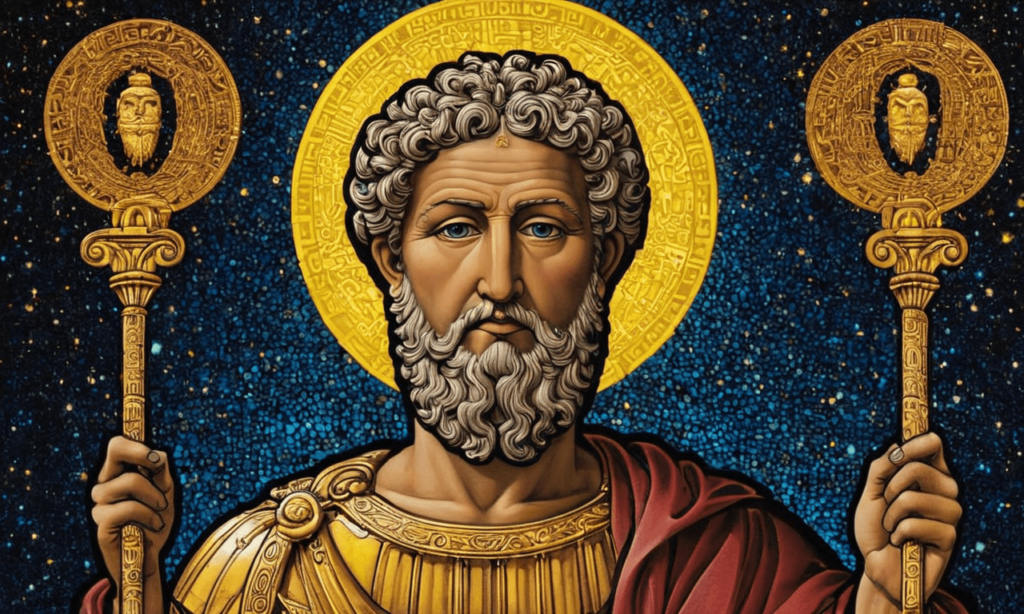
Marcus Aurelius’ Stoic Journey: Lessons in Self-Mastery
A. Embracing Stoic Principles in Daily Life
- Insights into Marcus Aurelius’ application of Stoic principles in governance and personal life
Known for his unwavering commitment to Stoicism, Marcus Aurelius exemplified the integration of philosophical principles into both his governance and personal life. As the revered Roman emperor, he navigated the complexities of leadership with Stoic virtues such as wisdom, justice, and temperance, striving to uphold the well-being of his people and the empire. Marcus Aurelius‘s Stoic resilience and rationality guided his decision-making, fostering stability and harmony during turbulent times. In his personal life, he embraced the Stoic philosophy of embracing the present moment, finding solace in the face of adversity, and cultivating inner tranquility.
Through his actions and writings, Marcus Aurelius left a lasting legacy as a Stoic philosopher-king, inspiring generations to follow his path of virtue and moral integrity, both in governance and personal conduct.
- Examination of key Stoic concepts such as virtue ethics, acceptance, and resilience
At the core of Marcus Aurelius‘s Stoic philosophy lies a profound understanding of key concepts essential for navigating life’s challenges with grace and resilience. Virtue ethics, central to Stoicism, emphasize the cultivation of moral excellence in one’s character, aligning actions with principles of wisdom, justice, courage, and temperance.
Marcus Aurelius, drawing from Stoic teachings, emphasized the importance of living in accordance with these virtues to achieve inner peace and fulfillment. Additionally, acceptance plays a pivotal role in Stoic philosophy, urging individuals to embrace circumstances beyond their control with equanimity and fortitude. By acknowledging the transient nature of external events, Marcus Aurelius teaches the importance of focusing on what lies within our sphere of influence, fostering resilience in the face of adversity.
Through these Stoic principles, Marcus Aurelius exemplifies a timeless wisdom that continues to inspire individuals to lead lives of virtue and tranquility.
B. Practical Strategies from Marcus Aurelius for Inner Peace
- Analysis of Marcus Aurelius’ Meditations and other writings on Stoicism
Marcus Aurelius, renowned for his leadership as a Stoic emperor, left behind a timeless legacy through his writings, particularly the Meditations. In this collection of personal reflections, Marcus Aurelius delves into the core tenets of Stoicism, offering profound insights into navigating life’s complexities with wisdom and virtue. Through introspective musings, he shares practical guidance on embracing adversity, cultivating resilience, and finding tranquility amidst turmoil. Marcus Aurelius‘s Stoic principles resonate with readers across generations, providing timeless wisdom applicable to modern-day challenges. His experiences as a gladiator, coupled with his role as a ruler, lend authenticity to his teachings, showcasing the practical application of Stoic philosophy in both personal and public life.
By analyzing Marcus Aurelius‘s writings on Stoicism, we gain invaluable lessons on leading a life of virtue, resilience, and inner peace.
- Exploration of Stoic techniques employed by Marcus Aurelius to maintain composure amidst challenges
Marcus Aurelius, revered for his adherence to Stoicism, employed various techniques to navigate life’s challenges with composure and resilience. As a Stoic practitioner and emperor, Marcus Aurelius faced immense pressure and adversity, yet his philosophical outlook enabled him to maintain inner tranquility amidst turmoil. Drawing from Stoic principles such as acceptance of the present moment and focus on virtue ethics, Marcus Aurelius cultivated a mindset of equanimity and resilience. His experiences as a gladiator further shaped his understanding of Stoic philosophy, reinforcing the importance of maintaining composure in the face of adversity.
Through practices like mindfulness, journaling, and reflection, Marcus Aurelius exemplified the application of Stoic techniques in real-life situations, offering valuable lessons on maintaining calmness and fortitude in turbulent times.
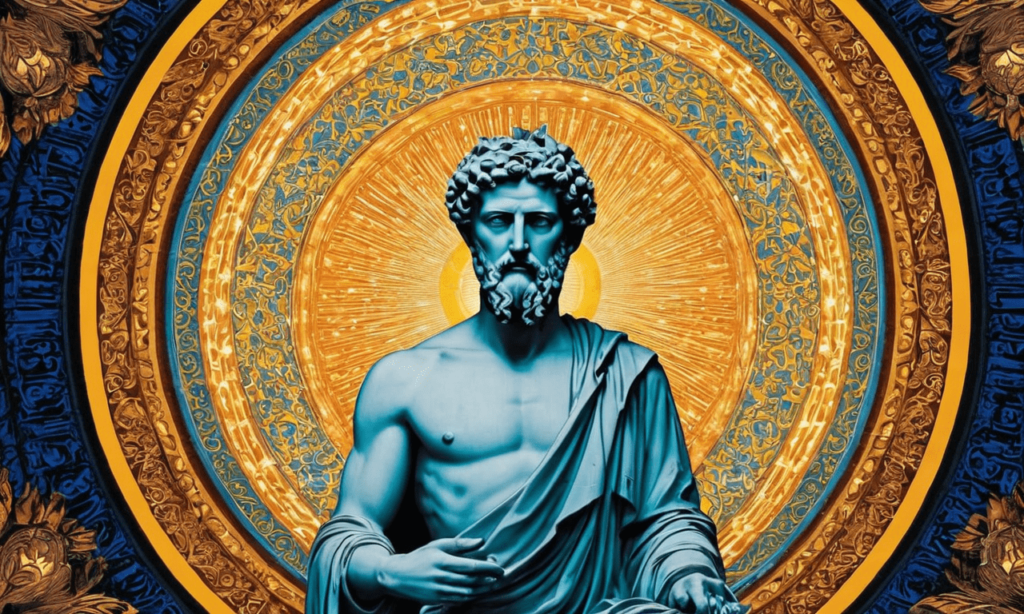
Conclusion
A. Reflecting on Marcus Aurelius’ Legacy
- Recap of key lessons learned from Marcus Aurelius’ Stoic journey
In reflecting on Marcus Aurelius’ Stoic journey, one discovers invaluable lessons applicable to modern-day living. As an emperor and Stoic philosopher, Marcus Aurelius embodied the principles of Stoicism in his daily life, facing challenges with resilience and wisdom. His experiences as a gladiator and ruler offered profound insights into the application of Stoic teachings in navigating adversity and maintaining inner tranquility. Through his renowned work, “Meditations,” Marcus Aurelius shared timeless wisdom on acceptance, virtue, and resilience, inspiring generations to adopt a Stoic mindset.
Key lessons from his Stoic journey include embracing the present moment, focusing on what’s within our control, and cultivating inner peace amidst external chaos. Marcus Aurelius’ legacy as a Stoic exemplar serves as a guiding light for those seeking clarity, calmness, and moral integrity in their own lives.
B. Encouragement for Applying Stoic Wisdom in Modern Life
- Invitation for readers to incorporate Stoic practices into their own lives for greater resilience and peace
As we delve into the profound teachings of Marcus Aurelius and his embodiment of Stoicism, we’re invited to embrace these principles in our own lives for enhanced resilience and peace. By integrating Stoic practices into our daily routines, inspired by Marcus Aurelius’ journey as a Stoic philosopher and resilient leader, we can cultivate inner strength amidst life’s challenges. Drawing from his experiences as a gladiator and emperor, Marcus Aurelius offers timeless wisdom on acceptance, virtue, and maintaining composure in the face of adversity.
Through the practice of mindfulness, journaling, and embracing the present moment, we can navigate life with greater clarity and equanimity. By heeding Marcus Aurelius’ call to incorporate Stoic principles into our lives, we embark on a path towards greater resilience, peace, and fulfillment.
C. Closing Thoughts: Marcus Aurelius’ Enduring Influence
- Inspiring readers to embrace the Stoic path towards inner tranquility, following in the footsteps of Marcus Aurelius
In the footsteps of Marcus Aurelius, we find an enduring legacy of Stoic wisdom that beckons us towards inner tranquility and resilience. As we navigate the complexities of modern life, embracing the Stoic path offers a guiding light towards serenity amidst chaos. Marcus Aurelius, renowned for his philosophical reflections in “Meditations,” exemplifies the essence of Stoic principles in his role as a gladiator and emperor. His teachings on acceptance, virtue, and resilience resonate deeply, inspiring us to cultivate a mindset of equanimity and peace.
By embracing Marcus Aurelius’ Stoicism, we empower ourselves to confront life’s challenges with clarity and grace, finding solace in the timeless wisdom of ancient philosophy. Let us embark on this transformative journey, following in the footsteps of Marcus Aurelius, towards a life of inner tranquility and enduring strength.
FAQs
- Who was Marcus Aurelius, and why is he important in Stoicism?
- What were some of the challenges Marcus Aurelius faced during his lifetime?
- How did Marcus Aurelius apply Stoic principles in his personal life and governance?
- What are some key teachings from Marcus Aurelius’ “Meditations” that help in taming inner turmoil?
- How can modern readers apply Marcus Aurelius’ Stoic practices to their own lives?
- Did Marcus Aurelius’ experiences as a gladiator influence his Stoic philosophy?
- What are some common misconceptions about Marcus Aurelius and Stoicism?
- How does Marcus Aurelius’ Stoic philosophy differ from other ancient philosophical schools?
- What role did Marcus Aurelius play in shaping the Stoic tradition?
- Where can I find reliable resources to learn more about Marcus Aurelius and Stoicism?

